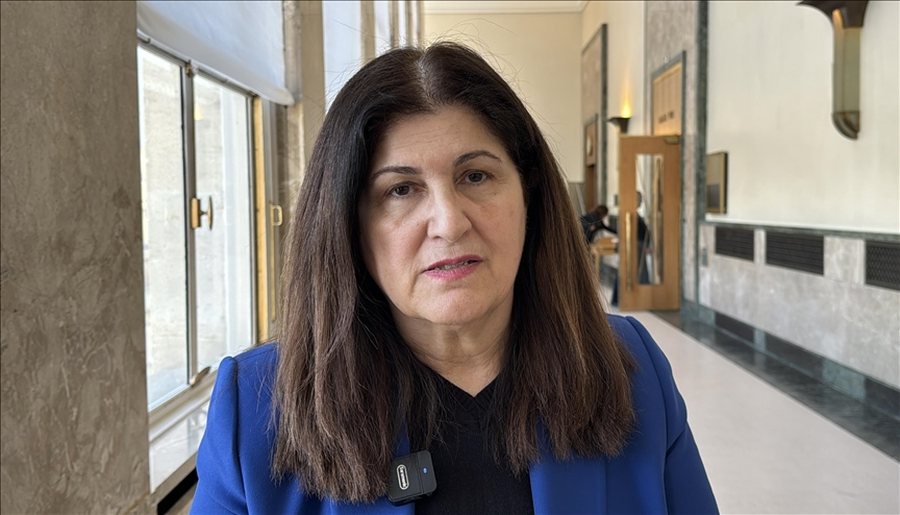
Palestinian Authority Foreign Minister Varsen Aghabekian called on the European Union to sanction Israel for its violations in Gaza and the West Bank, in line with the EU's own rules and values. She said that despite an agreement reached by the EU to increase aid to Gaza, civilians were still being killed trying to obtain food.
Aghabekian was in Brussels as EU foreign ministers failed to agree on any action against the Jewish state on Tuesday, despite an EU report showing that Israel is violating Article 2 of the Israel-EU Association Agreement, which stipulates that human rights and democratic principles must be respected.
"It's shocking and disappointing, because everything is very clear. I mean, there's a new EU report showing 38 violations by Israel. And it's an EU report," Varsen Aghabekian said in an exclusive interview with Euronews.
"These violations have happened before everyone's eyes. The whole world has seen what is happening in Gaza. The killings. The atrocities, the war crimes, the use of food as a weapon, the killing of people waiting in line to get a packet of flour," she said.
The Palestinian Authority governs the West Bank, while Hamas has controlled the Gaza Strip for most of the past two decades. It has been severely weakened by Israel's assault on Gaza.
The EU and its member states are the largest donors of humanitarian and development aid to the Palestinians, but due to historical divisions, they are unable to create a common foreign policy.
Ministers were given a range of options by EU Foreign Affairs chief Kaja Kallas to implement as possible sanctions against Israel in response to the violations.
Such options included suspending Israel's access to the EU's Horizon Europe research program, limited trade measures, an arms embargo, or sanctions against hardline extremist members of the Israeli government, such as Security Minister Itamar Ben-Gvir and Finance Minister Bezalel Smotrich.
Both Smotrich and Ben-Gvir have been sanctioned by the United Kingdom, Norway, Canada, New Zealand and Australia for "repeated incitement to violence against Palestinian communities in the occupied West Bank."
However, it was a foregone conclusion that no measure would be adopted, as most decisions require unanimity from all member states, and Germany, Austria, Hungary and the Czech Republic consistently reject any criticism of Israel's military campaigns in the Palestinian territories.
For decisions that require a qualified majority vote, whether Germany or Italy, the countries with the largest populations must support them, and neither was willing.
Last week, ahead of Tuesday's meeting, the EU reached an agreement with Israel to "significantly" increase the number of trucks carrying humanitarian aid, including medical food items, to Gaza.
EU foreign policy chief Kaja Kallas said on Tuesday that while there has been some improvement in the number of trucks entering Gaza, the situation is still "catastrophic."
In the days following the deal, dozens of Palestinian civilians, including many children, have been killed trying to get aid. On Sunday, Israel admitted a "technical error" after 10 people, including six children, were killed at a water distribution center in the Nuseirat refugee camp.
"I hope that the EU will put in place very strong screening measures to monitor compliance with the agreement, because if we look at the last week, since the agreement was reached, we see more killings of people," the foreign minister said.
"We see people killed at waiting points. We see children brutally killed while they are in tents. Waiting for medical care from another tent," said Aghabekian Shain.
Israel says the violence in Gaza is a response to Hamas stealing and diverting aid from starving Palestinians.
"There are conflicting reports about this. But despite this, whatever is being provided in Gaza does not meet the needs of the people of Gaza," she said.
Shahin Aghabekian said that where in the past there were 300 food and aid distribution points, today there are four.
"In the past there was one modality, and that modality worked because international organizations were distributing aid and had about 300 distribution points. Today we have a new modality with four distribution points," she told Euronews, according to A2 CNN.
In its latest humanitarian update on July 9, the UN estimated that a third of Gazans are going days without food and many more are at risk of starvation. Health services face imminent closure due to fuel shortages. (A2 Televizion)











